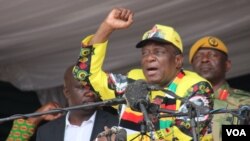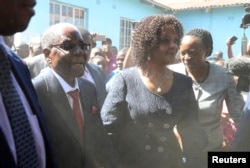Zimbabwe President Emerson Mnangagwa has issued a chilling warning to lawyers and doctors who assisted victims of a deadly government crackdown on fuel protests last month.
Speaking at a rally over the weekend, Mnangagwa vowed his readiness to deploy soldiers again to thwart protesters.
The southern African nation's main labor body, the Zimbabwe Congress of Trade Unions (ZCTU), called the mid-January protest over a 150 percent fuel hike, urging people to stay away from businesses and commercial activities for three days.
The government has blamed the opposition MDC Alliance for violence that left 13 citizens dead and scores injured. Citing media and civil society reports, the alliance counters that security forces led the charge to loot businesses.
Mnangagwa previously had called for an investigation into the violence. But at a rally Saturday, he chillingly vowed to pursue human rights lawyers and doctors, claiming they were aiding and abetting protesters.
"We are going to hunt down lawyers and doctors who were inciting violence. We are now going after them," the Zanu PF leader said in Rutenga, a community some 450 kilometers south of the capital, Harare.
He also warned that he was prepared to clamp down on any further demonstrations.
"Now they are planning more chaos," Mnangagwa said. "Those that want peace, stay at home so that we can deal with those that want violence."
Kucaca Phulu, a lawyer and legislator with the opposition Movement for Democratic Change (MDC) Alliance, contends that the Mnangagwa administration — despite its talk of a new approach — has adopted the repressive tactics of the president's immediate predecessor, Robert Mugabe. He was forced to step down in November 2017 after 37 years in power.
"If you look at Robert Mugabe, he said exactly the same words. So, this guy is merely rehashing," Phulu said. "Mugabe threatened lawyers all the time. He blamed everything on lawyers."
During Mugabe's administration, the United States and the European Union imposed sanctions against top officials in Zimbabwe's ruling party, its military and some government-owned firms as an impetus to correct human rights abuses and election problems. The United States has said it would lift sanctions once reforms have been implemented.
Phulu said that lawyers and doctors were performing their professional duties by aiding demonstrators and that government leaders lacked respect for Zimbabwe's constitution.
"Any progressive country should have those safety nets. Our constitution talks about access to legal aid. Everybody should have access to legal aid," he said. "Even a government which has charged you with treason should provide you with legal aid. This government is totally retrogressive. It's an illustration of shallowness."
Dumisani Nkomo of the Habakkuk Trust, a civil society group promoting peace, attributes protests within the country to deep-seated problems.
"This paranoia is very worrying, because as a country, we need to address the underlying reasons why people are protesting rather than the symptoms," Nkomo said. "This is an unfortunate attack on the institution of freedom and democracy."
Zimbabwe is in the midst of its most severe economic crisis in a decade, with shortages of food, medicine and other basics. On Monday, the country's Grain Millers Association notified the National Bakers Association that because the country hadn't paid for new imports of wheat, it could run out of flour for bread within a week, Reuters news service reported.
Addy Gondo is a correspondent for VOA's English to Africa Service, for which this story originated. Gibbs Dube of VOA's Zimbabwe Service contributed from Washington.






